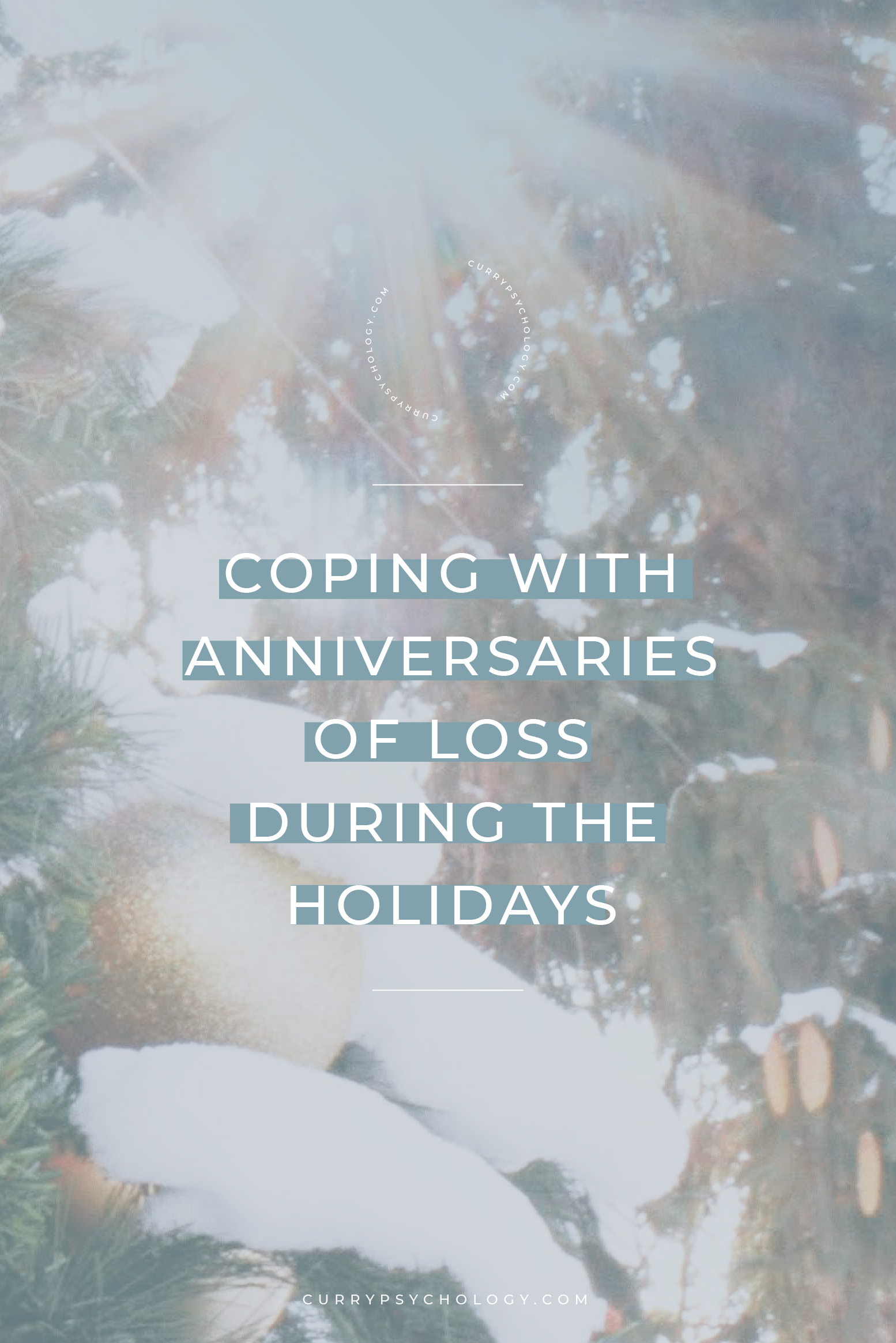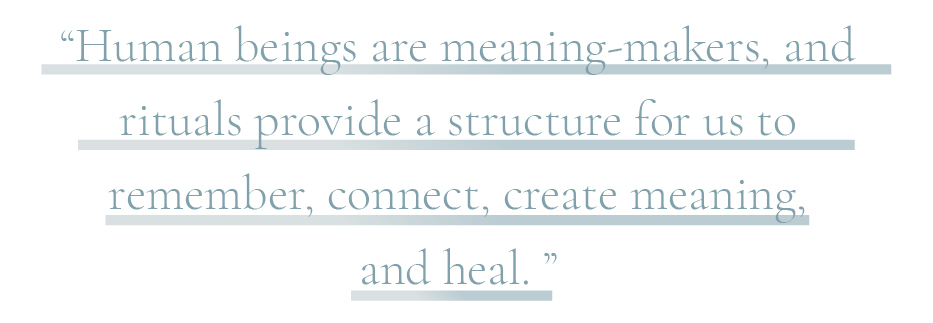December 10, 2019
When the Holidays are a Reminder of Loss
As a child, I recall feeling mystified when, one Christmas Eve not long after the death of my grandmother, I caught my father staring out the window with tears in his eyes. My eleven-year-old mind didn’t see the connection between Christmas Eve and her passing; she had died in March, almost two years prior. Later, I came to understand what we all learn with time: that our most joyful experiences can become equally painful reminders of a loved one’s absence. And the holidays are perhaps the most potent, poignant times for feeling the loss of happiness—and people—past. Let’s talk about holidays and loss.
Fortunately, there are ways that we can buoy ourselves against the full weight of grief during the holidays. Whether the source of our loss is death, divorce, or even falling gradually out of touch with someone who once meant a lot, the following approaches will keep you surviving and thriving this holiday season.
1. Holidays and Loss: Feel the pain.
Sometimes we hurt ourselves more in attempting to avoid pain than if we had stopped resisting and let ourselves simply feel it. As uncomfortable as grief feels, it is part of the natural healing process. While it may be tempting to try to numb or avoid the pain of loss through negative coping mechanisms like alcohol, drugs, overspending, isolating, or living in a state of perpetual denial, these behaviors actually extend the duration and severity of our suffering instead of alleviating it. So contrary to what our instincts may tell us—to escape, to avoid, to do anything other than feel the pain of our loss—the paradoxical truth is that the only way out of our grief is to move through it.
2. Holidays and Loss: Control what you can and accept everything else.
Let’s say holiday music and festive decorations are inexorable reminders of your mother’s perpetual holiday cheer, or the opening bars of White Christmas trigger painful ruminations that your ex is now celebrating with someone else. Though it would be difficult to barrage yourself against music and public decorations for all of November and December, you can take steps to minimize the frequency and intensity of your daily dose. Shop online for Christmas gifts instead of soldiering through the shopping malls, listen to your own Spotify mix of non-seasonal music in lieu of the radio, and decorate your house with fresh flowers and other beautiful things that don’t invoke holiday-induced sadness.
3. Holidays and Loss: Create a plan to minimize anticipatory dread.
Our anticipation of a dreaded experience often causes us more distress than the experience itself. To lessen the dread of anticipation, plan ahead as to what types of events will be manageable for you and which will likely bring up too many painful memories. This suggestion is distinct from the previous, in that it addresses planned events and not generic seasonal triggers. In this regard, you can:
- Decline invitations to any events that aren’t obligatory or important. Prepare what you’ll say ahead of time, so you don’t feel pressured to attend. For example, you might plan to say, “Thank you so much for inviting me. I already have plans, but maybe next year.” Or, “Thank you so much for the invitation, that night won’t work for me, but I do appreciate the thought.” This way, you avoid explanations that can invite objections, as well as lying, which is almost always more trouble than it’s worth.
- For invitations that you really must or should accept, strategize as to how to spend only an amount of time that is comfortable for you. Perhaps you might plan to arrive early so you have some quality time with the hosts before bowing out; or you could arrive toward the end, when you can’t possibly be forced to stay longer than intended.
4. Holidays and Loss: Practice a ritual that honors your loved one.
Human beings are meaning-makers, and rituals provide a structure for us to remember, connect, create meaning, and heal. Thus, it can be deeply cathartic to create and/or practice a ritual that helps you to honor the memory of your loved one. Your family, culture, ethnicity, or a particular religious or spiritual tradition may inform the ritual you choose to practice. Whatever ritual you choose, make a point of marking the beginning and end of your routine to help you transition into a different, more sacred frame of mind—e.g., ring a chime or bell, light a special candle, read an inspirational verse, poem, or prayer; or simply talk to your loved one.
When I was living in Hawaii, I learned of and participated in two rituals that I found to be profoundly healing. The first is Shinnyo-en Buddhist Lantern Floating. In this beautiful cermony, the names of and messages to lost loved ones are written on the rice paper of the lanterns, and a candle representing purification is lit in the lantern’s interior. The lantern is then floated out to the Pacific at dusk, where the water represents consolation, and the light glows against the horizon. The second ritual, recommended to me by a local healer while I was mourning the end of my marriage, was to braid a ti leaf by the water’s edge at dawn. In Hawaiian culture, the ti leaf is believed to possess healing, protective and restorative powers. I was told to weave all my sorrows and worries into the plant as I braided, and that when the leaf became a lei, I would find the tide had risen to me. At that time, I was to float the lei, and my sorrow, out to sea.
Whatever ritual you choose, the only guiding star you need follow is toward something that feels good and right to you.
5. Holidays and Loss: Write to your loved one.
I often suggest that my clients write letters to their loved ones, including former spouses lost to divorce. This can be a powerful release in which we are able to say all the things we would like to share with them, or make right. Sometimes it is a parent to whom we never really expressed our feelings. Or it might be a parent who never seemed able to express their feelings to us. It is surprising how deeply healing it can be to address someone who, for various reasons, we cannot speak to in person. Even though the message is not technically received, its transmission is powerful in ways we might not even understand.
6. Holidays and Loss: Dine with your loved one.
Even commemorating a loved one with a meal, and intentionally stating such can help us to feel connected.
Finally, if you are mourning a loss in your life this holiday season, please be gentle with yourself and remember: you are far from alone. Loss is part of the human condition, an inevitable companion to having loved at all. You are in good company, and, if all else fails, always reach out to those you love and trust for support. Tis the season, after all.







